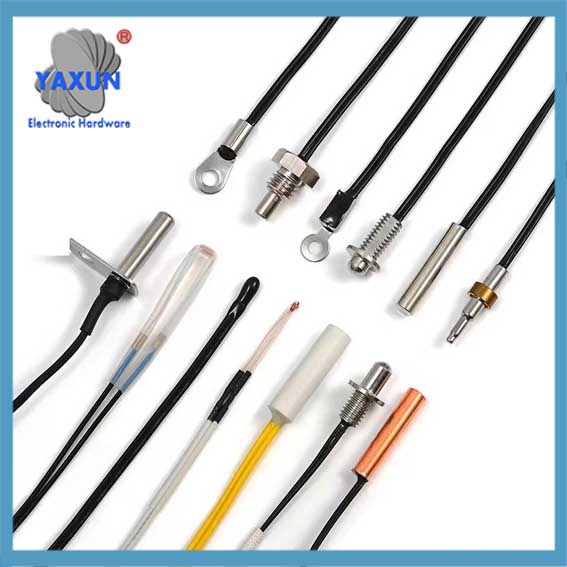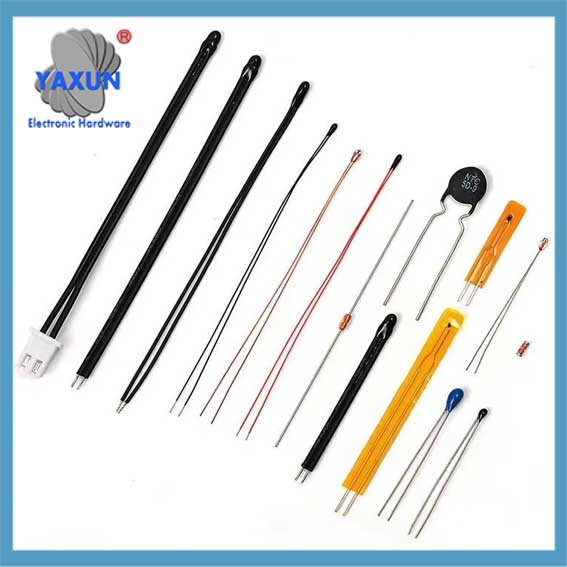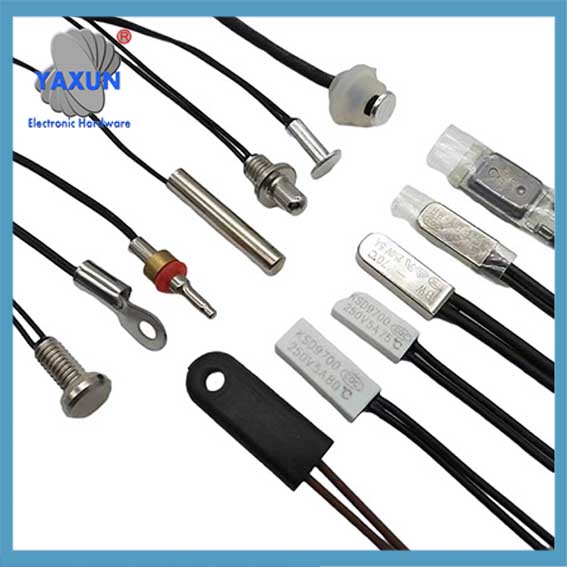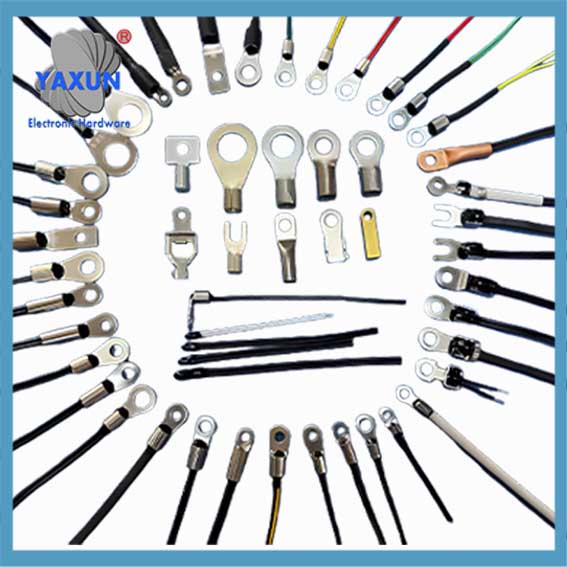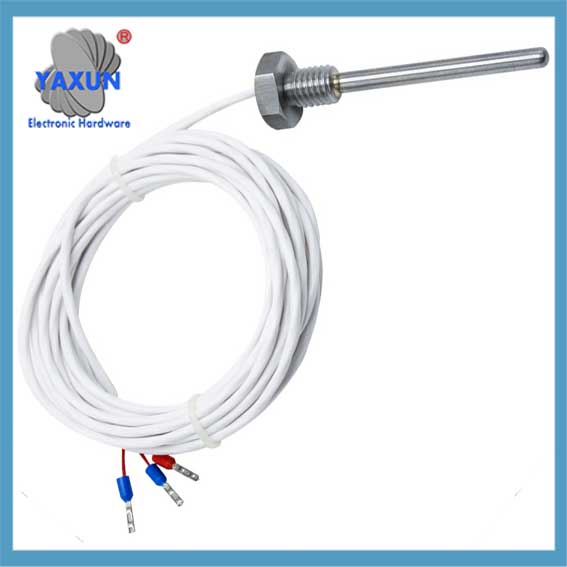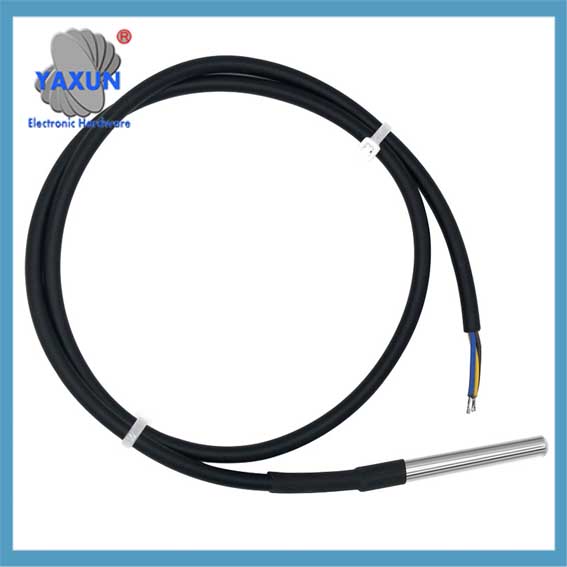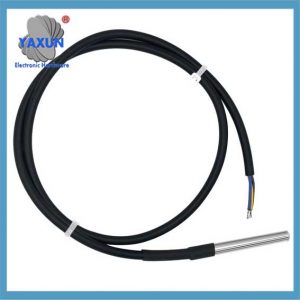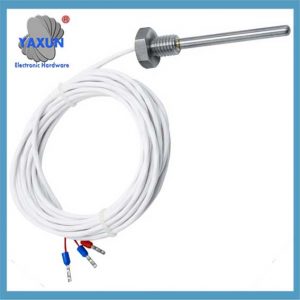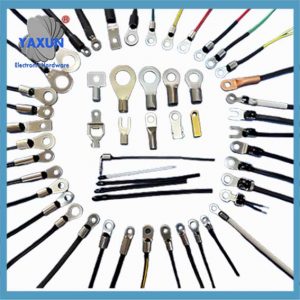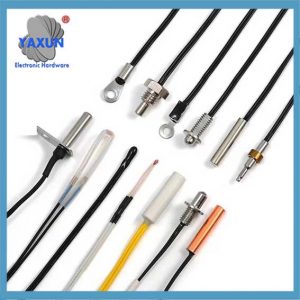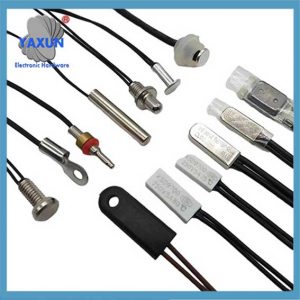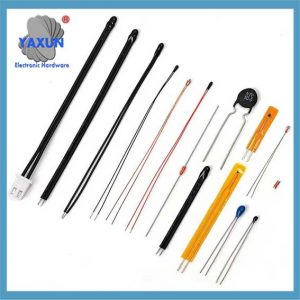catégories de produits
- Disjoncteur thermique 20
- Porte-boîte à fusibles 36
- Capteur de température 67
- Interrupteur thermique 64
- Fusible de voiture 19
- Fusibles boulonnés 7
- fusion thermique 32
- fusibles à montage en surface 12
- thermistance 22
- Porte-fusible à montage sur circuit imprimé 27
- Faisceau de câblage 6
- Porte-fusibles à lame 17
- thermostat 46
- Fusible électrique 14
Mots clés du produit
Messages récents
Sondes de température, Types de capteurs de température & candidatures
Une sonde de température est un dispositif utilisé pour mesurer la température, Composé généralement d'un élément sensible et d'un circuit de mesure. L'élément sensible peut être un thermocouple (PT100, PT1000), une résistance thermique (CNTS, PTC), un semi-conducteur (DS18B20 numérique), etc., qui peut convertir les changements de température en signaux électriques. Ensuite, il est amplifié, filtré, converti, et traité par le circuit de mesure, et enfin un signal électrique proportionnel à la température est sortie.
Temperature probes and temperature sensors are two different devices, and they have their own characteristics and application scenarios in measuring temperature.
Temperature Probe
UN “temperature probe” is a sensor used to measure temperature by converting the heat energy into a measurable electrical signal, and the most common types of temperature sensors within a probe include thermocouples, Resistance Temperature Detectors (RTD), and thermistors, each with distinct characteristics and applications based on the required accuracy, plage de température, and response time needed for a specific situation.
Definition: Une sonde de température est un dispositif utilisé pour mesurer la température, Composé généralement d'un élément sensible et d'un circuit de mesure. L'élément sensible peut être un thermocouple (PT100, PT1000), une résistance thermique (CNTS, PTC), un semi-conducteur (DS18B20 numérique), etc., qui peut convertir les changements de température en signaux électriques. Ensuite, il est amplifié, filtré, converti, et traité par le circuit de mesure, et enfin un signal électrique proportionnel à la température est sortie.
Working Principle: The working principle of the temperature probe is to use the response of the sensitive element to temperature changes to convert temperature changes into electrical signals. Common sensitive elements include thermocouples, résistances thermiques, semi-conducteurs, etc.. The working principle of the thermocouple is to use the thermoelectric effect of two different metals or alloys. When they are connected together and at different temperatures, an electromotive force proportional to the temperature is generated. The working principle of the thermal resistor is to use the property that the resistance of metal or semiconductor materials changes with temperature. When the temperature changes, the resistance value will also change accordingly. The working principle of semiconductor is to use the property that the conductivity of semiconductor material changes with temperature. When the temperature changes, the conductivity will also change accordingly.
Type: The types of temperature probes mainly include thermocouple probes, thermal resistor probes, semiconductor probes, etc.. Thermocouple probes use thermocouples as sensitive elements, and have the characteristics of wide measurement range, vitesse de réponse rapide, and high precision. Thermal resistor probes use thermal resistors as sensitive elements, and have the characteristics of high measurement accuracy, bonne stabilité, and strong anti-interference ability. Semiconductor probes use semiconductors as sensitive elements, and have the characteristics of small size, poids léger, and low power consumption.
Application fields: Temperature probes are widely used in industry, scientific research, medical care, environmental protection and other fields. Such as temperature measurement and control in chemical, pétrole, métallurgie, electricity, pharmaceutical, food and other industries.
DS18B20 Temperature Sensor Cable with Probe
Wiring: Rouge(VCC), Jaune(Data), Noir(GND)
Wide temperature range of -55 ℃ ~ +125 ℃
Power supply: 3.0V ~ 5.5V
Tips: Using a 4.7K resistor between the Data and VCC will make the testing of the probe easilier.
Thermocouple:
Fonction: Generates a voltage difference based on the temperature at the junction of two dissimilar metal wires.
Pros: Large plage de températures (-200°C to 1750°C), relatively inexpensive, fast response time.
Cons: Lower accuracy compared to other sensors, requires calibration tables to convert voltage to temperature.
Applications: High-temperature applications like furnaces, engine monitoring, industrial processes.
Thermistance:
Applications of Temperature Probes:
Processus industriels: Monitoring temperature in manufacturing processes like ovens, reactors, and extruders.
Systèmes CVC: Regulating room temperature in buildings by monitoring air temperature.
Food Safety: Monitoring food temperature during cooking and storage to ensure food safety.
Medical Devices: Measuring body temperature in patients through probes inserted into the body.
Industrie automobile: Monitoring engine coolant temperature and cabin temperature.
Scientific Research: Precise temperature measurements in experiments.
Capteur de température
Definition: A temperature sensor is a device that can convert temperature changes into electrical signals. It usually consists of a sensitive element and a signal processing circuit. L'élément sensible peut être un thermocouple, résistance thermique, semiconductor, etc.. The signal processing circuit can be an analog circuit, a digital circuit, etc., which together complete the acquisition, Traitement et sortie des signaux de température.
Working principle: The working principle of the temperature sensor is similar to that of the temperature probe. It also uses the response of the sensitive element to the temperature change to convert the temperature change into an electrical signal. Cependant, the temperature sensor usually has a more complex signal processing circuit, which can perform more advanced processing on the temperature signal, such as digital conversion, data storage, communication, etc..
Type: The types of temperature sensors mainly include analog temperature sensors, digital temperature sensors, and intelligent temperature sensors. Analog temperature sensors output analog signals, which need to be converted into digital signals through analog-to-digital converters. Digital temperature sensors directly output digital signals, and have the characteristics of strong anti-interference ability, haute précision, and easy integration. Intelligent temperature sensors have functions such as self-diagnosis, auto-étalibration, and communication, et peut réaliser une surveillance et un contrôle à distance.
Features: The temperature sensor has the characteristics of high measurement accuracy, bonne stabilité, forte capacité anti-interférence, and easy integration. Different types of temperature sensors have different characteristics, such as analog temperature sensors require analog-to-digital converters, digital temperature sensors directly output digital signals, and intelligent temperature sensors have functions such as self-diagnosis, auto-étalibration, and communication.
Application fields: Temperature sensors are widely used in smart home, smart wearable, équipement médical, automatisation industrielle, environmental monitoring and other fields, such as air conditioners, réfrigérateurs, machines à laver, thermomètres, sphygmomanometers, industrial control systems, etc..
How to choose?
When choosing a temperature probe or temperature sensor, the following factors need to be considered:
Application environment: Déterminez si l'environnement mesuré a des conditions spéciales telles que la corrosivité, température élevée, haute pression, etc., afin de sélectionner des matériaux et des niveaux de protection appropriés.
Measurement range: Sélectionnez un capteur approprié en fonction de la plage de la température à mesurer pour vous assurer que le capteur peut mesurer avec précision dans la plage requise.
Accuracy requirements: Select a sensor with corresponding accuracy according to the accuracy requirements of the application for temperature measurement.
Cost budget: Select a cost-effective sensor according to budget constraints.
How to use?
When using a temperature probe or temperature sensor, the following matters need to be noted:
installation: Install it correctly according to the installation instructions of the sensor to ensure that the sensor is in good contact with the object to be measured and avoid measurement errors caused by improper installation.
Wiring: Connectez correctement la ligne de signal et la ligne électrique du capteur pour assurer la stabilité et la précision de la transmission du signal.
étalonnage: Calibrez régulièrement le capteur pour s'assurer que sa précision de mesure répond aux exigences de la demande.
entretien: Nettoyer et maintenir le capteur régulièrement pour éviter la poussière, saleté, etc.. affecting the measurement performance of the sensor.
Temperature probe sensor is one of the important products of our YXAUN company. We focus on the fields of intelligent manufacturing and industrial automation, and provide a series of high-precision and stable measurement and control equipment, including temperature probe sensors. Our temperature probe sensors are widely used in industrial manufacturing, surveillance environnementale, energy management and other industries with their high precision, stability and adaptability to complex environments. If you have specific needs or questions about our temperature probe sensors, please feel free to consult us. We will wholeheartedly provide you with professional answers and services. What aspect of the temperature probe sensor do you want to know?
How to choose a suitable temperature probe sensor?
When choosing a temperature probe sensor, consider the temperature measurement range, exigences de précision, response speed and installation environment. Par exemple, thermocouples or platinum resistance can be selected for industrial environments, PT100 for high precision, and thermocouples for fast response.
Contactez-nous
En attente de votre email, nous vous répondrons dans les 12 heures avec des informations précieuses dont vous aviez besoin.
 English
English العربية
العربية Български
Български 粤语
粤语 中文(简体)
中文(简体) 中文(漢字)
中文(漢字) Nederlands
Nederlands Suomi
Suomi Français
Français Deutsch
Deutsch Ελληνικά
Ελληνικά Magyar
Magyar Italiano
Italiano 日本語
日本語 한국어
한국어 Polski
Polski Português
Português Română
Română Русский
Русский Slovenščina
Slovenščina Español
Español Svenska
Svenska ภาษาไทย
ภาษาไทย Türkçe
Türkçe Tiếng Việt
Tiếng Việt
